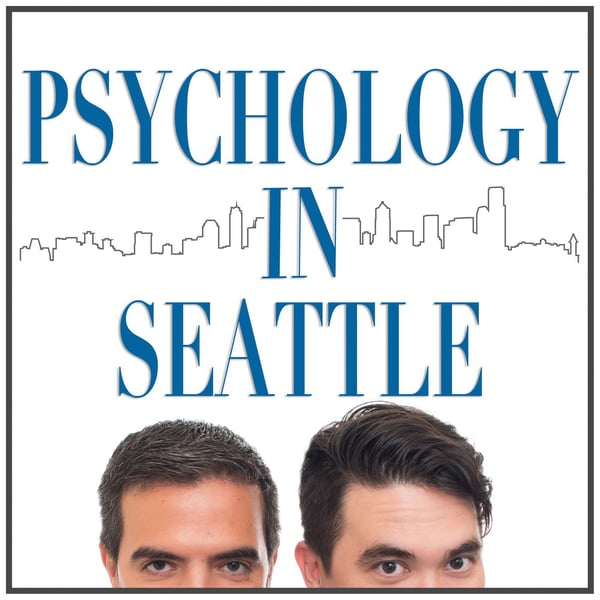More Listener Questions
Psychology In Seattle Podcast
Kirk Honda
4.6 • 1.2K Ratings
🗓️ 5 July 2021
⏱️ 75 minutes
🧾️ Download transcript
Summary
Become a patron: https://www.patreon.com/PsychologyInSeattle
Email: https://www.psychologyinseattle.com/contact
Get merch: https://teespring.com/stores/psychology-in-seattle
Dr. Kirk’s Cameo: https://www.cameo.com/kirkhonda
Instagram: https://www.instagram.com/psychologyinseattle/
Discord: https://discord.gg/6QR4sE8x9K
Reddit: https://www.reddit.com/r/PsychologyInSeattle/
Twitter: https://twitter.com/PsychInSeattle
Facebook Official Page: https://www.facebook.com/PsychologyInSeattle/
Facebook Fan Page (run by fans): https://www.facebook.com/groups/112633189213033
The Psychology In Seattle Podcast ®
Trigger Warning: This episode may include topics such as assault, trauma, and discrimination. If necessary, listeners are encouraged to refrain from listening and care for their safety and well-being.
Disclaimer: The content provided is for educational, informational, and entertainment purposes only. Nothing here constitutes personal or professional consultation, therapy, diagnosis, or creates a counselor-client relationship. Topics discussed may generate differing points of view. If you participate (by being a guest, submitting a question, or commenting) you must do so with the knowledge that we cannot control reactions or responses from others, which may not agree with you or feel unfair. Your participation on this site is at your own risk, accepting full responsibility for any liability or harm that may result. Anything you write here may be used for discussion or endorsement of the podcast. Opinions and views expressed by the host and guest hosts are personal views. Although, we take precautions and fact check, they should not be considered facts and the opinions may change. Opinions posted by participants (such as comments) are not those of the hosts. Readers should not rely on any information found here and should perform due diligence before taking any action. For a more extensive description of factors for you to consider, please see www.psychologyinseattle.com
This show is part of the Spreaker Prime Network, if you are interested in advertising on this podcast, contact us at https://www.spreaker.com/show/3269717/advertisement
Transcript
Click on a timestamp to play from that location
| 0:00.0 | Hey, just having listeners. Just me today. I thought I would answer some of your questions. This |
| 0:04.2 | first question is, why would someone have deep insecurity about being lovable, even though they |
| 0:10.6 | had good enough parents and experienced unconditional love and of question? Yeah. This is an interesting |
| 0:18.7 | question relevant, particularly to this podcast since I am so often connecting relationship issues, |
| 0:25.1 | attachment issues, emotional issues as an adult to issues with parenting early in life, particularly |
| 0:31.5 | early in life. And some people will say, well, I had a pretty good childhood and yet I have deep |
| 0:39.8 | insecurities as an adult or research shows that sometimes that happens. Well, there's a number |
| 0:47.2 | of different possibilities and it's impossible to know. It's all just conceptualization. We don't |
| 0:52.2 | have the science yet and I don't foresee it happening in my lifetime to be able to measure these |
| 0:59.8 | things. So there's too many things that play. There are multiple things happening to children |
| 1:05.8 | and adults that can impact their psychology. There are multiple ways to interpret it. Our brains |
| 1:12.2 | are very odd organs that don't always behave in ways that are predictable. So we just don't have |
| 1:21.6 | the ability to know for sure. But conceptualization wise, here's what I will often look towards as |
| 1:28.0 | hypotheses. One is that, yeah, so you'll have an adult. They'll be like, I have deep insecurities. |
| 1:34.0 | I think I have preoccupied attachment and my parents were really great. I didn't have any traumas. |
| 1:38.4 | Everything was fine. There are a number of possibilities that I've often investigated and found |
| 1:44.6 | to seem to be a good candidate as to why that would happen. One is that for some people, |
| 1:51.8 | when they look back on their childhood, they see parents and family life that was pretty good. |
| 1:58.8 | But it's hard to detect what was actually going wrong in the parenting. For example, |
| 2:05.2 | you can have a, and I've treated clients like this. You can have a parenting style that is very |
| 2:11.9 | loving and very secure and non-chaotic and non-abusive, where the child throughout their life |
| 2:20.4 | knows absolutely. My parents love me. My parents will always be there for me. My parents are not |
... |
Please login to see the full transcript.
Disclaimer: The podcast and artwork embedded on this page are from Kirk Honda, and are the property of its owner and not affiliated with or endorsed by Tapesearch.
Generated transcripts are the property of Kirk Honda and are distributed freely under the Fair Use doctrine. Transcripts generated by Tapesearch are not guaranteed to be accurate.
Copyright © Tapesearch 2025.

